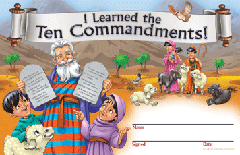 |
| Ten Commandments Bulletin Board Set |
 |
| Ten Commandments for Kids |
Show the Ten Commandment tablets to your students. Say, Moses climbed the mountain to meet with God so God could give Moses His Commandments for the Israelites. Why did God have to give them these rules? Aren’t they just common sense? Have different students (or adult or teen helpers) read each commandment from Exodus 20. Then discuss it. Have verses 1-3 read. Why did God have to tell His people to worship only Him? (because He is the only true God)
Have verses 4-6 read. Ask, Who made graven images (idols)? (countries who didn’t worship the true God) Why would God need to punish the whole family? (People imitate what their parents do; if their parents worship idols, they would tend to worship idols, too.)
Have verse 7 read. Ask, What does it mean to take God’s name in vain? (“Vain” means “not as intended” and “empty.” To misuse God’s name as a swear word is not what God’s name was intended for. It shows disrespect for God.)
Have verses 8-11 read. Ask, Does this mean that we have to do nothing on Sundays? (It means we worship God then and do not forget to take time to do so.)
Have verse 12 read. Does God mean that we have to honor and obey only biological parents or does He mean anyone who is responsible for us? (It means we obey our caregivers, whoever they are.)
Have verse 13 read. Does God mean that if we treat someone in hateful ways but don’t actually kill them, that’s okay? (No, it means we should not think or say murderous things with our eyes or words. Jesus clarified this in Matthew 5:21-26.)
Have verse 15 read. If anyone wonders why you skipped verse 14, tell them that this verse deals with what adults do, not what children usually do. Ask What is stealing? (taking anything that does not belong to you, no matter how small, without permission)
Have verse 16 read. Say, Bearing false witness means to lie, to say something that isn’t true. Is it ever right to lie? (No, you should always tell the truth, but out of love so that you don’t hurt someone.)
Have verse 17 read. Ask, Why is it wrong to wish for things you don’t have that belong to others? (because it can lead to stealing and lying to get them for yourself, and God wants us to be content with what we have.)
Toss a foam ball to a student and have her give the first commandment. Have her toss the ball to another student who will give the second commandment, etc. If anyone has trouble remembering his commandment, the rest of the group can help. If necessary, refer to the Ten Commandments Tablets. Encourage your students to follow God's commands during the week.
Give a Ten Commandments Certificate to each child who can say all Ten Commandments (with your help) after this lesson (or the following week). These certificates are available in packages of 36 for just $2.99 (item #CD201007). Click on the image for more details and to order the certificates. Visit ChristianEdWarehouse.com for more classroom decorations and teaching ideas.
 |
| Ten Commandments Certificate |

